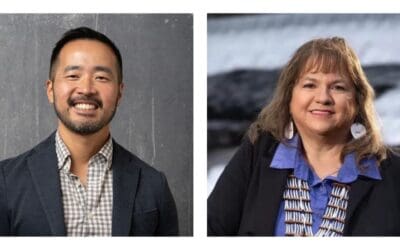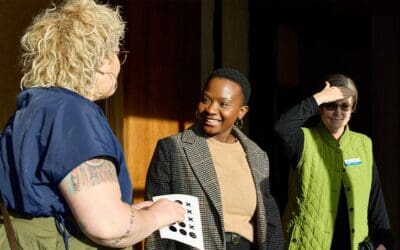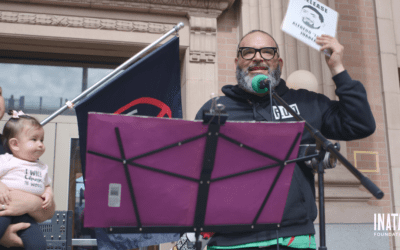Until Feb. 1, 2023, we were Group Health Foundation. This post was written under our former identity. To learn more about our new name, read our announcement here.
Lee y mira esta conversación en español.
Hanncel Sanchez founded Mujeres in Action (MiA) in 2018 after her volunteer work at a sexual assault survivors’ helpline revealed that her community was missing from these calls. She knew that people were experiencing similar crises in Spokane’s Latino community. As Hanncel explains, “One in three Latina women will experience physical or sexual violence throughout their lives. Where are they looking for help?”
For the last five years, Hanncel has made it her and MiA’s mission to be the answer to that question, breaking down access and language barriers for people in need. In this community conversation with GHF Program Officer Jorge Gutierrez at MiA’s new office, Hanncel shares more about her personal journey finding and building community in Spokane, as well as MiA’s plans to expand their services using support from the Systems, Power, and Action grant they received. Her advice to others: “If there is a change you want to bring to the community, I dare you to do it. You can do it!”
Learn more at MiA’s website and find them on Facebook and Instagram.
Full video transcript
JORGE:
Hi, I’m Jorge Gutierrez, a Program Officer at the Group Health Foundation. We are an organization which offers grants throughout the state of Washington. We are proud to support Mujeres in Action, a nonprofit organization dedicated to serving survivors of domestic and sexual violence in the Latino community. MiA is the first of its kind in Spokane. I’m here today talking to Hanncel Sanchez, the founder and executive director of MiA.
Five years ago, Hanncel volunteered to answer calls at a crisis hotline for a local organization. Very soon, she realized that she never encountered Spanish speakers during these calls. Hanncel wanted to make sure her community was supported. And that’s when she decided to found Mujeres in Action.
Hanncel, thank you for being here with us.
HANNCEL:
Thanks, Jorge.
JORGE:
Well, look, Hanncel, you and I have already known each other for a few years, and I’m very excited that others can hear a little more about your story. Tell me, for those who are meeting you for the first time, could you share a little more about your story, and maybe tell us who Hanncel Sanchez is?
HANNCEL:
Well, Jorge, I am originally from Venezuela. I came to the United States with my parents and my brothers when I was between 12 and 13 years old. We arrived in Orlando, Florida, looking for that American dream—a better life, aspiring for a better education, security. We were in Venezuela, we grew up very poor, and there was a lot of violence. And, well, my parents were looking for a better future for their children, and I’ve been grateful all my life that they brought us here. And I lived many years in Orlando.
Then we realized that we wanted more opportunities, especially in education—being a “Dreamer”—educational opportunities in Orlando were limited. Then, nothing. We had that dream of looking for another place where we could, my siblings and I could continue studying, looking for a better future. And, so, we saw that Washington state was one of those states, that are good for immigrants here, and the many benefits, so we ventured to leave our whole lives in Orlando and came to the state of Washington. We got to the SeaTac area. From there, I applied to Eastern Washington University. And well, that’s what brought me to the Spokane area.
JORGE:
Thank you, Hanncel, and look how lucky it is for the state of Washington to have you here. Now I would like to talk a little bit about your motivation to found MiA. Tell me what motivated you, and why was it important to you to found this organization, and also why did you decide to focus on this community?
HANNCEL:
When I got to Spokane, I didn’t like the lack of diversity. I was like, well, I don’t feel like I fit in here. It wasn’t until later that I found a Latino church, and I felt really good. I felt more at home, and little by little, I began to appreciate this community more. But what involved me the most was serving the community more, volunteering here and there. And as you mentioned, volunteering for that helpline for survivors of sexual violence. I realized – I saw we never did outreach to the Latino community. And I was like, well, sexual violence is happening in our community. Right? One in three Latina women will experience physical or sexual violence throughout their lives. And I said: If this is so, where are they looking for help? Where are these people looking for help?
And well, I also consider myself a survivor of sexual violence. And, that was in my heart, and I started to ask, I started to know the community more and see what organizations were offering these services. But I realized that there was that need, that there was no intentional outreach to our Latino community. And I think that’s what moved me to do something about it. I said, well, that’s a problem. As an immigrant, I know how difficult it is to be in a place, to need help. And even more so if it is a trauma or sexual violence, for example, which is even more serious, and not having that support, and not having people who speak your language, and not having the confidence to go to an organization to ask for help. That’s what I wanted: to make that difference.
JORGE:
Yes. Well, this next question you already started to answer a little, but in the past, you have shared with me that language access is one of the first barriers you and the organization are helping the community overcome, and you do this in several different ways with the services you provide, but also, with advocacy at the local level and with the development of resources such as Spokane’s first resource book in Spanish, which congratulations! But tell me, why is language access important?
HANNCEL:
Good question, Jorge. I think language is something so important and so close to the identity of what it is to be a Latinx, Latina, Latino person. I think it’s the way we communicate, it is the way in which we express our person, what we are, right? And for a survivor to be able to talk about domestic violence, sexual violence, about their experience, to be able to do it in their language, it’s something very big, right? It’s something that gives you that confidence, gives you that courage of being able to share something so, so difficult, right? And I think that was my focus at the beginning, when we started MiA my focus was, ok, we have to support survivors, but do it in a way that is culturally appropriate. I want this to be from our people, for our people.
And well, from there we realized that basically, in all support systems, all the systems that are supposed to support survivors, there was always the language barrier, right? Sometimes there was either no interpreter or no one who spoke the language. For example, in hospitals, right, in emergency rooms, we have had several circumstances with our participants where they are not being provided with an interpreter, for example, in in their language, right, in Spanish. And something so simple, something as basic as being able to communicate what’s going on with your body, or for the doctors to tell you what is happening with you and do it in your language, so that you can understand and there are no misunderstandings—that is something so important and something so necessary.
And then we, through our advocacy directly with participants and the family, we have realized that basically all systems have that obstacle. They have that barrier, and until we change that, the community will not have the confidence to seek help, right? It is difficult for survivors in general to seek help, even more difficult for immigrants when they do not know the language, and there is no interpreter, and there are no people that look like them in different systems, in different organizations. Well, it already creates that distrust, and that is why it is important to create that access to language, to provide that confidence, so that people ask for help and know that it is important—that we care for them and that they deserve the support.
JORGE:
Yes, well I am very glad to know that you already have that resource, but I would like to know what you did, if someone needed a service and if they didn’t have an interpreter, what would people do?
HANNCEL:
Well, many times, what we have learned, is that in many systems in Spokane, for example, when there is no interpreter, people basically have to bring their interpreter, or many times they have used their partners, and for many of our participants, that was the person who was abusing them.
So, for example, in the emergency room—we had a case in 2020 that a survivor came to the emergency room to seek help for her pregnancy and came with her partner, her husband, who was abusing her at the time, and the medical staff used the husband to interpret because they did not want to provide them with a professional medical interpreter to do that job. And then obviously, the husband did not interpret because he did not care, and it just created more of the power dynamic, a dynamic of control on his part toward her.
So, these are the types of cases that we are seeing. And like I said, well, when they don’t provide an interpreter, well, people are forced themselves to bring interpreters, whether it be a friend or sometimes they pay someone to come, but then it falls on the person to provide their own access to language, which is not fair.
JORGE:
Well, since we are talking about systems, MiA received a grant from our Systems, Power, and Action program. If you remember, these funds are designed to support organizations that are fighting to ensure that our public institutions are held accountable to all communities in the state of Washington, and well, I know that the MiA is focusing on providing direct services, but more recently you have also been focusing on advocacy and I would like to know if you can tell us a little more about this work, and maybe you could also tell us what the connection is between the services MiA provides and the advocacy you’re doing.
HANNCEL
Of course, of course. Well, first of all, thank you very much! Forever grateful here to Group Health Foundation who gave us that grant which allowed us to take our work to another level.
I think it all started in 2020, when our advocates working with families, with survivors, realized was that the systems—every time we went to a system, to the hospital, to the courthouse, to the police, for example, there was always that language access barrier. Many times, they did not offer us interpreters. So, on paper, the role of interpreter fell to our advocates—they had to translate or interpret, which made their work more difficult. So, I think it was very often that these situations occurred, and we realized that we had to do something about the system.
For example, one of the things we’re doing right now is preparing a letter to send to one of the local hospitals—first, we file our complaint and where the rights violation occurred with our participants. But we also ask them to put, for example, posters in hospitals in different languages that say something like, “Hey, you have the right to a medical interpreter.” The point is that, many times, immigrants, people in our community don’t know they have that right, and if they don’t have that knowledge, they don’t know how to advocate for themselves and request access to these types of services. The systems, therefore, take advantage of that lack of knowledge and do nothing about it. It’s not until we raise our voices and say, “That’s it. That’s enough. This has to change. The changes are going to happen.”
Another thing that we are doing, for example, with the Superior Court of Spokane, we are looking for more language access, not only during the hearings, but also that, for example, documents are available in other languages. Our advocates, when they provide legal support to our participants, for example, they have to fill out protection orders. Our advocates are translating the protection order and helping to fill out this document, but they are super long, big forms, in complicated, technical language, and it takes a lot of time of our advocates. That time is precious and should be used to support the family rather than interpret documents.
So, these are conversations we’ve had with the court to lead us to that issue and make changes about it. These are two of the examples that I can share of what we are able to do now thanks to that grant from the Group Health Foundation. We now have a staff member dedicated to doing that kind of advocacy.
JORGE:
Yes, well, I’m very happy to hear that, and I’m curious, as you are starting to push on systems a bit—I imagine the local systems are not used to organizations pushing and asking for these services. How have they responded?
HANNCEL:
Hmm, good question. With the court, for example, I think we had initial conversations, and and they have been good. I think it has been a good response so far, but it hasn’t been anything concrete. We really don’t know if these conversations—if they are going to achieve real change, so I could not tell you in that respect. With the city, for example, something that we are working on with the city is to create language access, to multiple languages. We don’t see much reception.
As far as with the city officials, there is more, there is more resistance to that. They think they don’t need to have interpreters at City Council meetings, for example, because there aren’t that many immigrants in Spokane, they say. And it’s not really like that. I think the Spokane immigrant community is growing a lot, but, well, some systems refuse to see that—to see that and to realize that they need to change. So, we are, we are still seeing what type of response these systems are going to have.
JORGE:
Yes, well look, it is something that is happening not only in the entire state, but, I imagine, in the whole country, that the systems are having to react to changing demographics, but I’m glad to hear that you’re already having those conversations at a local level, and I imagine it is something that will take some time.
Well, let’s change the topic a little bit. As you know, at GHF we support hundreds of leaders through our various grant programs, and, well, I imagine that many of them could relate with your experiences. Since you have several years as an executive director, I would like to know do you have some reflections, or, perhaps, some lessons about leadership that you would like to share with others.
HANNCEL:
Yeah, sure, wow! Well, it’s a very good question. Also, I believe that to be a leader you have to serve. I think it starts with that, with a humble heart and a desire to make a change, right? Yes, I would say to the people who are listening to us that, if there is something you want to change, if there is a change you want to bring to the community, I dare you to do it. You can do it.
How? Well, it’s important to also surround yourself with people who support you, your dream, that they also have that passion and fire to make a change in the community, that they also believe in the mission and therefore support your dream. I think without the people who have supported me so far, from the beginning, since I first shared my frustrations that—Hey, there aren’t enough services for our Latino community. There is no access to language—those kinds of frustration, I think other people were also frustrated, and we joined together, right? We were able to get on the same page, in the same spirit of making change, and so we were able to do it. I don’t think—you don’t do it alone. You need people, people who support you.
JORGE:
Yes, well, I have had the pleasure of seeing MiA grow, but also I have had the pleasure of seeing you grow as a leader in your community, in your organization, and, really, in the state. I would like to know what moments are you most proud of over these last years?
HANNCEL:
I think there are several. One of my personal favorites was graduating, finally, with my bachelor’s degree in women and gender studies at Eastern Washington University. I did that in 2019. It was a bachelor’s degree that took me 12 years to achieve, so I think that’s one of the things I’m most proud of.
I also think being able to have a physical space, a physical office in which our advocates and my staff can work, and to see participants here is a source of pride. It’s something—I never imagined we would get this far as an organization. But I think the fact that we’ve grown so much speaks volumes about the need that is also in the community, here in Spokane. It is an honor for me to be able to do this work.
JORGE:
Well, congratulations! It is a very big achievement.
HANNCEL:
Thank you!
JORGE:
This next question is a little different than the others, but one of the things I like most about my job is that it gives me the opportunity to travel around the state and see different parts of Washington. Tell me, since I’m here in the Spokane area, can you share some of your favorite things to do here in this area?
HANNCEL:
Yes, I think the river—I think it’s one of the most wonderful things we have here in Spokane. I love walking along the riverbank, listening to the water. So, I recommend you do that before you return home. I also like the Riverfront Park, which is close to downtown Spokane. It’s pretty. They have developed it very well. They have installed new things there, and well, it is a very cool place, a place for families to share. It’s nice! I recommend it.
JORGE:
Thanks, yes, I have been to Spokane several times, and I always say, I have to go visit these places, and time always runs out. So, hopefully I can do it this time.
HANNCEL:
Hopefully!
JORGE:
Well, for the people who want to stay in touch and learn more about your work and the work of the organization, how can they connect with you? And this is also an opportunity for you to tell us: Is there anything else you would like to share?
HANNCEL:
Yes, well, to know more about MiA, visit our website miaspokane.org, and find us on social networks. We are on Facebook, on Instagram. You can search to connect with our monthly newsletter. That’s where you can learn a lot about what’s going on at MiA, and hear stories we can share from participants. That’s a great way to stay connected and learn more of the work we do.
Well, I think to share, we are in the month of April. It’s Sexual Assault Awareness Month. We say in English Sexual Assault Awareness Month. We call it “SAAM,” in honor of survivors of sexual violence. I want to encourage the people who are watching us to—when someone shares about an incident of sexual violence or abuse that they have suffered—to believe them. It takes a lot, a lot of courage, a lot of courage to share something like that with a person, and well, we can treasure that and believe the survivors, right? Do not doubt what they tell us and connect them with resources. It’s important that people can watch videos like these and be able to learn about sexual and domestic violence, to be able to share resources with people when they need it, with our loved ones. It is something so prevalent that it touches us all. In one way or another, we are going to be impacted by sexual violence or domestic violence, and for that reason, it is important to be there for survivors.
JORGE:
Well, thank you very much, Hanncel, for being here with us and giving us your time.
HANNCEL:
Thank you. I appreciate the invitation to share about the work we do. It’s an honor. Thank you!
JORGE:
On behalf of everyone at Group Health Foundation, we want to thank you for all the leadership and for the work you do to help your community. Again, Thank you very much. And for you who are watching this video, thank you very much for joining us. If you want to know more about MiA, Mujeres in Action, please visit the website which is miaspokane.org. Thank you very much and see you later.



